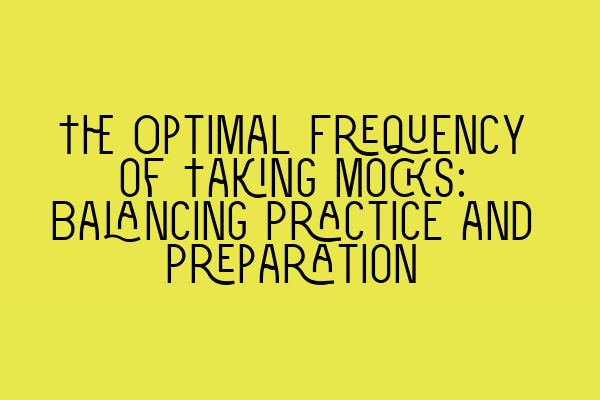The Optimal Frequency of Taking Mocks: Balancing Practice and Preparation
As aspiring solicitors, preparing for the Solicitors Qualifying Exam (SQE) is a crucial step towards a successful career in law. One of the most effective ways to assess your knowledge and improve your performance is by taking mock exams. Mocks allow you to simulate the exam experience, identify areas of weakness, and refine your test-taking strategies. However, the question arises: what is the optimal frequency of taking mocks? In this article, we will explore the importance of balancing practice and preparation to determine the ideal frequency for mock exams.
Why Take Mock Exams?
Before delving into the optimal frequency of taking mocks, let us first understand why they are an essential part of your SQE preparation. Mock exams provide several key benefits:
- Evaluation of Knowledge: Mocks help you evaluate your understanding of the exam material and identify areas where you need further study.
- Time Management: Taking mock exams allows you to practice time management skills, ensuring you can complete the real exam within the given timeframe.
- Stress Management: Mock exams help familiarize you with the exam environment, reducing anxiety and stress on the actual exam day.
- Strategy Refinement: By analyzing your performance in mock exams, you can refine your study strategies and develop techniques to tackle different types of questions.
The Balancing Act: Frequency of Taking Mocks
While mock exams are undoubtedly beneficial, it is important to strike a balance between practicing with mocks and dedicating time to other aspects of your SQE preparation. Here are some factors to consider when determining the optimal frequency of taking mock exams:
1. Study Stage
The frequency of taking mock exams may vary depending on the stage of your study. In the initial stages, it is advisable to focus more on understanding the exam content and building a strong foundation. As you progress, gradually increase the frequency of mock exams to gauge your progress and fine-tune your exam strategies.
Related article: Workshops on Land Law: Interactive Learning for Aspiring Property Law Professionals
2. Time Availability
Consider your schedule and allocate sufficient time for both mock exams and regular study. It’s important to strike a balance to avoid overwhelm or burnout. A realistic plan will help you maximize the benefits of mock exams without compromising on other aspects of your preparation.
3. Feedback Analysis
Mock exams alone are not enough; analyzing the feedback and identifying areas for improvement is crucial. Allocate ample time after each mock exam to thoroughly review your performance and make note of the topics or question types that require additional attention.
Related article: Lease Laws in the UK: Unraveling the Legal Framework for Tenants
4. Confidence Building
Mock exams also play a significant role in building confidence. As you progress through your study plan, gradually increase the frequency of taking mock exams to boost your self-assurance and familiarity with the exam format.
Final Thoughts
The optimal frequency of taking mock exams is a personal decision that depends on various factors such as study stage, time availability, and feedback analysis. It is advisable to start with a moderate frequency, gradually increasing it as you become more comfortable with the exam content and format. Remember to strike a balance and allocate sufficient time for thorough review and analysis after each mock exam. By finding the sweet spot between practice and preparation, you can enhance your performance and increase your chances of success in the SQE.
Related articles:
Tenant Rights in the UK: Understanding Your Legal Protections,
Legal Considerations in Residential Leases: Essential Insights for Solicitors,
Navigating Legal Challenges in Property Transactions: Expert Tips for Success.

Leave a Reply